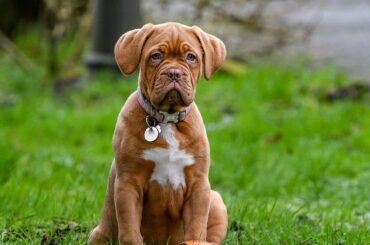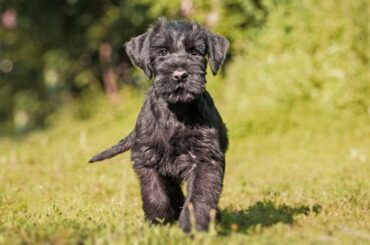Table of Contents
Introduction into Pit Bull Puppies
Pit Bull Puppies are often known by their specific breed names such as American Pit Bull Terrier or Pit Bull Terrier, is a fighting dog that originated in nineteenth-century England, Scotland, and Ireland from bulldog and terrier ancestors for hunting, specifically catching and restraining semi-feral livestock. The name has historically been attributed to various canine breeds, including the bull terrier, American Staffordshire Terrier, and Staffordshire Bull Terrier, however the American Kennel Club does not recognize it as a unique breed.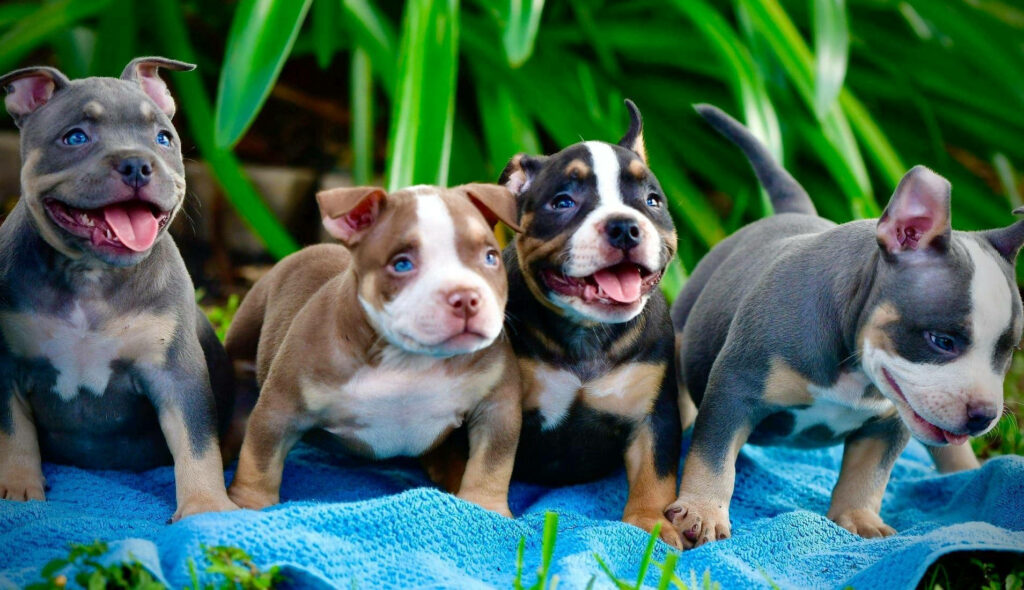
Pit Bull Puppies were initially bred for bull baiting and dog fighting, and as a result of this lineage, they frequently attack other animals with astonishing ferocity, contributing to the breed’s public notoriety.
Pit Bull Puppies are recognized for their tenacity and stubbornness to relinquish a bite even when under extreme agony. A common misconception is that pit bulls have “locking jaws.” The refusal to let go is a behavioral tendency, not a physiological one, and there is no locking mechanism in a pit bull’s jaws. PitBull Puppies, like other terriers, hunting and bull-baiting breeds, can bite, hold, and shake and sometimes refuse to release.
Pit Bull Puppies are not uncommon in the sense that they are difficult to find or breed. PitBull Dog Puppies, which include numerous similar breeds such as the American Pit Bull Terrier, American Staffordshire Terrier, and Staffordshire Bull Terrier, can be found in many parts of the country, and there are breeders and rescue groups dedicated to these dogs.
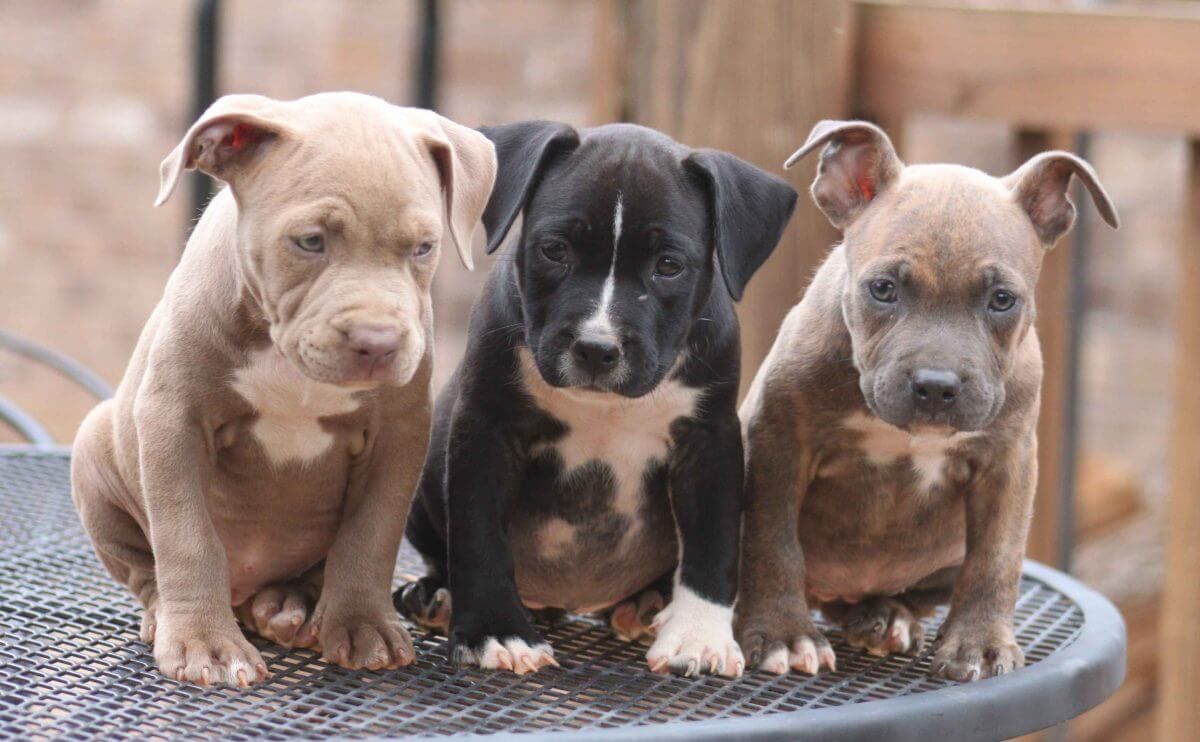
Pit Bull Puppies Physical Features And Appearance
Pit Bull Puppies, like any puppies, are adorably cute and progress through numerous growth phases as they mature into adults. It’s worth noting that the word “Pit Bull” can refer to a variety of breeds, including the American Pit Bull Terrier, American Staffordshire Terrier, and Staffordshire Bull Terrier. These breeds share some morphological characteristics and bodily attributes. The following are what Pit Bull Puppies look like:
- Pit Bull Puppies are small at birth and grow rapidly during the first few months of life. By the time they reach adulthood, they typically fall into the medium-sized dog category, with males being slightly larger than females.
- They have short, smooth coats that are relatively low-maintenance. These coats come in a variety of colors, including brindle, black, blue, fawn, and red, among others.
- Pit Bull Dog Puppies have broad, blocky heads that become more pronounced as they grow. They have well-defined, strong jaws.
- Their ears can be either natural or cropped, depending on individual preference. Natural ears are typically medium-sized and may be folded over. Cropped ears are often erect and stand upright.
- Pit Bull Puppies have a compact, muscular build, which becomes more evident as they grow. Their chests are broad, and they have a strong, athletic appearance.
Pit Bull Puppies, like adults, come in various sizes and weights, and these can vary depending on factors like genetics, breed type, and individual growth rates. Pit Bull Dog Puppies are born very small and may fit in the palm of your hand. At birth, they typically weigh about 8 to 16 ounces (227 to 454 grams). As Pit Bull Dog Puppies grow, it’s important to provide them with a balanced diet and regular veterinary care to ensure they reach a healthy and appropriate size for their breed type. Genetics and the health of the puppy’s parents also play a role in determining their final adult size.
Pit Bull Puppies Behavior
Pit Bull Puppies, like puppies of any other breed, go through various developmental stages and exhibit specific behaviors as they grow and mature. Pit Bull Puppies are generally very playful and full of energy. They love to engage in various forms of play, whether it’s chasing a ball, wrestling with their littermates, or playing with toys. Pit Bull Puppies go through a teething phase where they’ll chew on anything they can find to alleviate the discomfort of their growing teeth. To ensure they grow up to be well-adjusted and friendly dogs, expose your Pit Bull Puppies to different people, animals, and environments to help them become comfortable with a variety of situations.
Pit Bull Puppies are naturally affectionate and loving. They often form strong bonds with their owners and enjoy being close to them. Pit Bull Puppies have a lot of energy and require regular exercise. Playtime, walks, and other physical activities are crucial for their physical and mental well-being.

Pit Bull Puppies Temperament
Pit Bull Puppies, like every other breed, have varying temperaments. It’s important to remember that genetics, socialization, training, and the environment in which a dog is raised all have an impact on their temperament. Pit Bull Dog Puppies, on the other hand, such as American Pit Bull Terriers, American Staffordshire Terriers, and Staffordshire Bull Terriers, are frequently noted for particular traits that can be detected in their puppies:
- Affectionate
- Energetic
- Intelligent
- Protective
- Playful
- Social
Pit Bull Puppies Training And Caring
Pit Bull Puppies are an active breed, and their puppies are no different. Pit Bull Dog Puppies need regular exercise to expend their energy and maintain good physical and mental health. Pit Bull Dog Puppies are aggressive and are recognized for their tenacity and stubbornness, exposing your Pit Bull Dog Puppies to a variety of people, animals, environments, and situations to help them develop into well-adjusted, confident adults. This can help prevent fear and aggression issues.
Pit Bull Puppies have short coats that require minimal grooming. Brushing your puppy occasionally and bathing them when needed is usually sufficient. Be patient and show your Pit Bull Dog Puppies plenty of love and affection. Positive reinforcement and a nurturing environment will help your Pit Bull puppy thrive.
Pit Bull Puppies Health Issues And Life Span
Pit Bull Puppies, like dogs of other breeds, can lead long, healthy lives with proper care. The lifespan of a Pit Bull can vary depending on several factors, including genetics, diet, exercise, and overall health. On average, the lifespan of a Pit Bull falls within the range of 10 to 15 years.
Pit Bull Dog Puppies can be prone to health issues like Hip Dysplasia, allergies to various environmental factors such as pollen, food ingredients, or fleas, skin conditions, heart disease and Cancer.
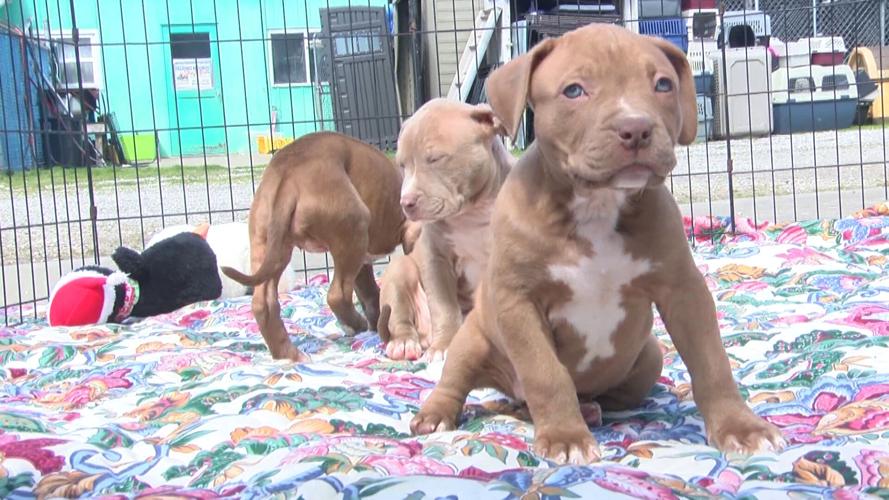
Pit Bull Puppies Price
The price of Pit Bull Puppies can vary significantly depending on various factors such as the dog’s pedigree, bloodline, location, breeder reputation, and the specific type of Pit Bull (American Pit Bull Terrier, American Staffordshire Terrier, etc.). On average, you can expect to pay anywhere from $500 to $2,000 or more for a Pit Bull Puppy. Some puppies from well-known breeders with strong bloodlines and health certifications may even cost more.
Conclusion
In conclusion, Pit Bull Puppies are popular and beloved pets known for their loyalty, intelligence, and affectionate nature. When considering getting Pit Bull Dog Puppies, it’s crucial to choose a reputable breeder or consider adopting from a shelter or rescue organization. Reputable breeders prioritize the health and well-being of the puppies, while adoption provides loving homes for Pit Bulls in need.
Regardless of your choice, proper training, socialization, and responsible ownership are essential to ensure that Pit Bull Dog puppies grow into well-adjusted and happy adult dogs. Additionally, it’s important to check your local regulations and breed-specific laws, as some areas may have restrictions on owning Pit Bulls or certain Pit Bull breeds.
READ MORE
- American Bulldog Puppies For Sale: Find Your New Best Friend
- Plott Hound Puppies: 7 Unique Physical Features, Behaviour And Health
- American Water Spaniel Puppies – 4 Amazing Physical Appearance, Traits & Facts
- Beauceron Puppies – 6 Amazing Beauceron Puppies Facts and Information
FAQs
Are Pit Bull Puppies safe?
Pit bull owners often say that the dog is not dangerous because pit bulls have not been proved to bite people more often than other dogs bite people. Nevertheless, it has been proved that the injuries inflicted by pit bulls are far worse than injuries caused by other common breeds of dog.
What not to do with a Pit Bull Puppies?
Pit Bull Puppies, when tired and agitated, can easily land into fights with other dogs at such places. So, it's best to avoid dog parks. Instead, you should socialize your Pitbull in a controlled environment, such as attending suitable behavior dog classes or a small play date with well-mannered dogs.
Are Pit Bull Puppies easy to train?
This breed is easier to train than many other breeds. Pit Bull Puppies are more likely to obey their 0wners and require fewer command repetitions. For owners who love to be active, Pit Bull Puppies will keep you well exercised. This breed is very energetic and requires daily activity to stay in shape and remain content.

